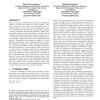Free Online Productivity Tools
i2Speak
i2Symbol
i2OCR
iTex2Img
iWeb2Print
iWeb2Shot
i2Type
iPdf2Split
iPdf2Merge
i2Bopomofo
i2Arabic
i2Style
i2Image
i2PDF
iLatex2Rtf
Sci2ools
106
click to vote
ATAL
2006
Springer
2006
Springer
Social coordination without communication in multi-agent territory exploration tasks
In the recent past, several different methods for coordinating behavior in multi-robot teams have been proposed. Common to most of them is the use of communication to coordinate behavior. For many practical applications, however, communication might not be an option (e.g., because of energy constraints of embedded platforms, limited communication range of wireless transmitters, security risks of potential interception of messages in hostile territory, etc.). In this paper we examine alternative, low-complexity, lowcost strategies without communication for coordinated agent behavior. Specifically, we investigate the utility of a "social preference mechanism" and a "pairing mechanism" in territory exploration tasks (with many practical instantiations, e.g., two robots with different sensory capabilities investigating rock formations on a remote planet), where agents have to explore their environment to find and visit k checkpoints, which only count as "visited&q...
| Added | 20 Aug 2010 |
| Updated | 20 Aug 2010 |
| Type | Conference |
| Year | 2006 |
| Where | ATAL |
| Authors | Paul W. Schermerhorn, Matthias Scheutz |
Comments (0)

